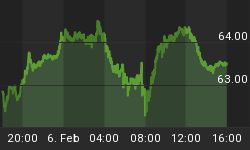"What's it all about Alphie" is a sing-along that most have heard.
Take out the word "Alphie" and substitute "Draghi" and the answer is "Assuage Investors" in yet another can-kicking exercise.
ECB president Mario Draghi hopes that if he continues with his kick-the-can tactics long enough, that something good will eventually happen.
Hope is really all the ECB has.
Meanwhile, Draghi Reinforces ECB Stimulus Momentum to Assuage Investors.
Having already cut interest rates to record lows and saying they can go no lower, Draghi is now focused on boosting the ECB's balance sheet. He told reporters today that he expects to increase assets back toward March 2012 levels. That's 3 trillion euros, or about 1 trillion euros [$1.2 trillion] more than the current level.
The ECB has issued long-term loans to banks and started buying covered bonds in the hope of flooding the economy with enough liquidity to ease credit constraints. Purchases of asset-backed securities are due to start this month.
"We are quite confident that the impact on our balance sheet size will be adequate, will be significant, will be sizable," Draghi said. "The main message is that our balance sheet will keep expanding in the coming months and will continue expanding while the balance sheets of other central banks is bound to contract."
Berenberg Bank economist Christian Schulz said he sees a 60 percent chance the ECB will enter the 1.4 trillion euro market for investment grade non-financial corporate bonds next month.
"Whatever It Takes" Revisited
Draghi's famous "Whatever it takes ... And believe me, it will be enough" statement in July of 2012, resolved the Eurozone sovereign bond crisis (for now) (see Eurozone Target2 Imbalances Rise Again, Led by Italy), but it did not spur lending.
His move to boost the balance sheet of the ECB will not spur lending either. Headwinds explain why.
Headwinds
- No structural problems in the eurozone have been fixed.
- A lower Euro may help exports in general but it will do nothing to help the competitiveness of Spain, Italy, or France as compared to Germany.
- Europe is a demographic mess. With an aging population and low birthrates, pension promises cannot possibly be met.
- France and Germany are increasingly at odds.
- The rise of Marine LePen in France, Beppe Grillo in Italy, and euroscepticism in general elsewhere.
- The UK threatens to leave the EU.
- There has been little real reform or austerity anywhere. Government spending accounts for 56% of French GDP. France, Italy and Spain fail year after year to meet budget requirements.
- European banks are way over-leveraged, especially in so-called risk-free sovereign bonds. No one really believes the latest round of stress tests.
- The global economy, especially China is slowing. Export growth will slow accordingly.
- There is no juice, only risk associated in the ECB buying sovereign government bonds.
Let's explore point number 10 in more detail starting with a look at government bond yields.
10-Year Government Bond Yields
- Spain: 2.16%
- France: 1.19%
- Italy: 2.38%
- Germany: 0.83%
- US: 2.37%.
Spain 10-Year Bond Yield
Question of the Day
If a decline in yield from 7.74% in July of 2012 to 2.16% today did not spur lending, then why would any further decline, even to 0% spur lending?
The answer is "It Won't".
If you think otherwise, please note that German bonds have negative yields in every timeframe two years or shorter.
Germany 2-Year Yield
As remarkable as it may sound, you actually have to pay money (receive negative interest rates) for the privilege of lending money to Germany for two years.
Yet, economic dunderheads want Draghi to buy sovereign bonds.
Should the ECB do that (and it probably will), the ECB faces two risks.
- European sovereign bonds are already way overpriced thanks to "Whatever it Takes" phase 1.
- Buying bonds could trigger a constitutional crisis in Germany. Such actions are against Germany's constitution and the treaties that created the eurozone.
Of course, in these "Whatever It Takes" moments, no one gives a damn about constitutions, treaties, or anything else.
Worse yet, economic fools embark on policies that cannot possibly work even if they were legal. The higher inflation Draghi seeks is actually counterproductive! Europe's demographics make the matter worse.
For a discussion of that absolute absurdity in seeking higher inflation, I have some suggested reading.
Suggested Reading
- Challenge to Keynesians "Prove Rising Prices Provide an Overall Economic Benefit"
- "Will These Central Bank Morons Ever Learn?" asks Albert Edwards at Societe General
- James Grant Conference Video: Inflation Expectations, Growth, Policy Problems; Europe Has Become Japan.
- Deflationary Spiral Nonsense; Keynesian Theory vs. Practice; Eurozone Policymakers Concerned About Falling Prices
Sisyphean Fed Struggle to Create Inflation
Here are a few snips from my Monday commentary Sisyphean Fed Struggle to Create Inflation.
My comments are in response to a statement made by Bill Gross in his Janus Investment Outlook that "simple math" shows the "real economy needs money printing".
Gross needs to replace "simple math" with "exponential math" coupled with the fact central banks can (for a while) target prices in general, but they cannot target wages or the prices they want.
Back to the Drawing Board
The Fed expanded money supply by $4 trillion dollars and the CPI is up less than 2%!
What's the Fed going to do for an encore when the global economy slumps, US jobs with it, and prices of goods services, and assets sink?
Expand money supply by $8 trillion? $16 trillion? $32 trillion? Buy equities? Buy more than 100% of debt issuance like Japan?
How nuts does it get?
Gross concludes with "The real economy needs money printing". I suggest Gross go back to the drawing board and come up with a different answer.
With Japan, Europe, and the US central banks all in economic wonderland, a currency crisis of immense proportions and a breakup of the eurozone are on deck.

















